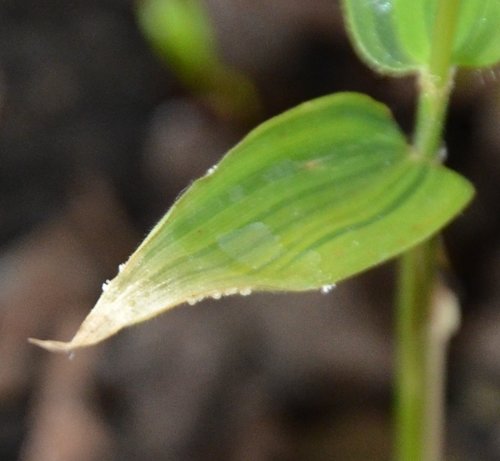Page 1 of 1
Identify the infestation(s)
Posted: Sat Feb 08, 2014 7:59 pm
by Franco
Further to my post on browning of tips, and further to a note by John from NS, I had a closer look at the leaves of my most "brown tipped" plants. There are definitely pests, I just don't know if they are bamboo mites. I do have tiny little black "flies" with what look like clear wings hovering around my soil/plants.
Below is a pic of my Pleioblastus viridistriatus, which I thought was doing well, but it now certainly infested with something.

- Note obvious cream/white bumps on leaf edge.
A pic of my Pseudosasa owatarii (?) :
and a pic of my Semiarundinaria Fastuosa:
All I suspect have of some sort of infestation. Any help on identification and, most importantly, TREATMENT would be much appreciated.
Re: Identify the infestation(s)
Posted: Sat Feb 08, 2014 10:57 pm
by johnw
re: flies oaround soil would be sciarid flies, aka fungus gnats. No chems in Canada suitable. Sticky sticks work on the adulkts but larvae dio the root damage.
Can't tell anything about any bugs in photo 1 on the viridi.
Can't see anything on photo 2 leaves.
Last photo definitely mites but can't tell if they are spotted mites, spider mites or bamboo mites. The latter usually stay under their slightly shiny webs and you need a hand lens to see them. - No suitable chems for any here. Any chem containing canola or oils can cause more problems as mentyioned in the bamboo mite thread. The only solution I know of is pick leaves and burn. Some west coast nurseries will tell you they spray with a chem beginning with the letter A....... but still they ship live mites aplenty.
johnw - 0c
Re: Identify the infestation(s)
Posted: Sun Feb 09, 2014 9:07 am
by Tarzanus
Dry air inside will promote multiplication of mites. The second insect you are seeing is fungus gnat. They are laying eggs into the wet soil and soon, small worms appear. They feed on decomposing organic material in the soil (mainly), but will love to nibble fresh roots and emerging stems if you're trying to grow seedlings.
On a nice warm day, put them out and spray them with insecticide that will also kill mites. Gnats will survive, but if you destroy most of the population, they won't multiply that fast. And one more thing, fungus gnats love moist environment. Let the top soil dry a bit.
Re: Identify the infestation(s)
Posted: Sun Feb 09, 2014 2:48 pm
by johnw
Tarzanus - The problem is as stated - there are no effective insecticides available for use in Canada. They have mainly all been banned except for pyrethrums and they are useless for gnats & mites.
Re: Identify the infestation(s)
Posted: Sun Feb 09, 2014 4:51 pm
by Alan_L
Aren't there some forms of BT that work on fungus gnat larvae?
One simple solution is to make sure your soils dry between waterings -- don't let them stay wet all the time! Sticky traps do help.
Re: Identify the infestation(s)
Posted: Sun Feb 09, 2014 8:32 pm
by johnw
There's a parasite (Hypoaspis miles) and a nematode (Steinernema feltiae) for gnat larvae. The former can wander off unless in a contained and screened ghouse. The nematodes work well at warmer temps but not at this time of year if in cool storage - applied as a soil drench. I like the nematode but everytime you pot up or introduce a new pot you have to re-treat and it can get expensive.
Unfortunately the predator for bamboo mites is not available in North America.
Re: Identify the infestation(s)
Posted: Mon Feb 10, 2014 12:04 am
by Franco
Thanks all - set up sticky traps and cutting watering. Also clipped all damaged leaves off S. Fastuosa. I heard that fungus gnat larvae are attracted to potato so I might try that as well.
Re: Identify the infestation(s)
Posted: Mon Feb 10, 2014 2:53 pm
by Tarzanus
I've been thinking about getting predators that can effectively eliminate mites and aphids - ladybugs (and especially their ever-hungry larvae)! It's a bit harder to keep them inside during the winter.

You can try soaking tobacco leaves (cigarettes or plain tobacco) for a day or two in water, filter it, add some dishwasher soap and spray it over the infected leaves and soil. It may or may not help, I guess it will kill all existing mites but leave their eggs intact. If it works, you can try again in a week or two to eliminate newly hatched mites.
Re: Identify the infestation(s)
Posted: Mon Feb 10, 2014 3:12 pm
by needmore
I unintentionally have lady bugs indoors every winter and they are cruising around still this year so they have figured out how to live indoors so you might be able to have them as well. It is kind of refreshing to have a bug land on you indoors in a horribly cold winter.
Re: Identify the infestation(s)
Posted: Thu Feb 13, 2014 2:39 pm
by Alan_L
needmore wrote:...It is kind of refreshing to have a bug land on you indoors in a horribly cold winter.
Not when they're fungus gnats. Those things are annoying!
